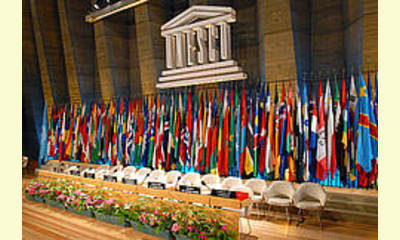|
|
Sustainable development and culture of peace at the heart of the 36th session of UNESCO’s General Conference
un article par UNESCO Media Services
UNESCO’s General Conference, which meets every two years, will hold its 36th session from 25 October to 10 November at the Organization’s Headquarters in Paris. The session will be attended by delegations from 193 Member States, as well as Associate Members, observers for non-Member States, intergovernmental organizations and non-governmental organizations (NGOs).

click on photo to enlarge
During this session, expected to be presided over by Ms Katalin Bogyay (Hungary), the General Conference will decide on the proposed programme and budget for the 2012-2013 biennium, which gives priority to sustainable development, culture of peace and non-violence, with a special emphasis on gender equality, Africa, youth, Education for All (EFA), Least Developed Countries (LDCs), Small Islands Developing States (SIDS) and the most vulnerable segments of society. It will also pave the way for early work on the Organization’s next Medium-Term Strategy for 2014-2019.
The General Conference will also consider requests for the admission of Palestine to UNESCO, as well as requests for the admission of Curaçao and Sint Maarten as Associate Members.
Several Heads of State are expected to attend different events at the General Conference, including Pal Schmitt, President of the Republic of Hungary; Yayi Boni, President of the Republic of Benin; Georgi Parvanov, President of Bulgaria; Alassane Ouattara, President of the Republic of Côte d’Ivoire; Ali Ben Bongo Ondimba, President of the Republic of Gabon; Tillman Thomas, Prime Minister of Grenada; Susilo Bambang Yudhoyono, President of Indonesia; Raila Odinga, Prime Minister of Kenya and Sukhbaataryn Batbold, Prime Minister of Mongolia.
Many of these high-level personalities will participate in the Leaders’ Forum (26 and 27 October), on the theme “How does UNESCO contribute to building a culture of peace and to sustainable development?”, which will reflect on these important international development issues and UNESCO’s future priorities in these areas. A special plenary meeting on 2 November will be devoted to the celebration of the tenth anniversary of the adoption of UNESCO’s Universal Declaration on Cultural Diversity.
UNESCO will also inaugurate an exhibition entitled “Open UNESCO” promoting the work of the Organization. The exhibition, which will be open to the public in December, will include a variety of visual elements explaining the work of the Organization through seven “islands” each focused on a particular theme.
This session of the General Conference will be the first since Irina Bokova was elected Director-General on 15 October 2009.
(Click here for a French version of this article or here for a Spanish version).
|








|
DISCUSSION
Question(s) liée(s) à cet article:
Will UNESCO once again play a role in the culture of peace?,
* * * * *
Commentaire le plus récent:
It is very appropriate that this new impulse for the culture of peace at UNESCO should come from Côte d’Ivoire, since the global movement for a culture of peace was initiated at a UNESCO conference in that country in 1989. See Yamoussoukro and Seville in the early history of the culture of peace.
Note added on September 2:
The official reports from the UNESCO Conference in Abidjian are now available:
English
French

|
|









